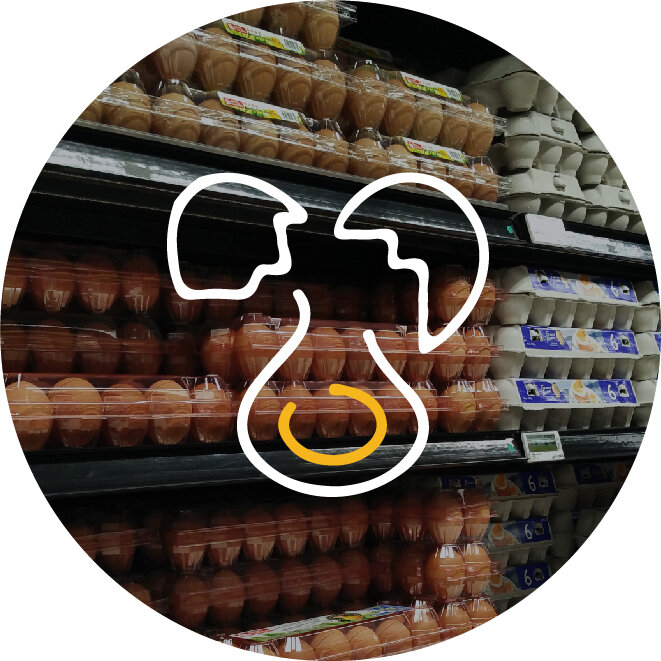
Ensure That Your Business Meets Cage-Free Laws
If your business operates in Arizona, California, Colorado, Massachusetts, Michigan, Nevada, Oregon, or Washington, you need to be prepared to comply with the law and ensure you have the products your consumers are looking for.
The State of Change
Over the past two decades, consumers have shown increasing concern for the welfare of farm animals. As a result, voters and state legislatures across the country have passed laws that ban the sale and/or production of meat and eggs from animals that were confined in crates or cages. In 2022, California and Massachusetts’ laws prohibiting the sale of eggs from caged hens went into effect. Similar cage-free egg laws in Nevada, Oregon, and Washington went into effect in 2024. As of 2024, the sale of pork from operations that confine mother pigs in gestation crates is prohibited in in Massachusetts and California. These laws apply whether the products were produced in or out of state. Retailers, distributors, restaurants, and food service companies operating in these states must be prepared to comply with these laws to avoid civil fines, criminal animal cruelty charges, and in some cases, jail time.
Click on a state to learn more about the legal requirements.
Food companies across the United States are contacting their suppliers to ensure that they are supplying compliant meat and eggs. Contact your own suppliers with this draft language.
Food companies operating in California and Massachusetts are contacting their suppliers to ensure that they are supplying compliant meat and eggs in 2022. Contact your own suppliers with this draft language.
What Products Are Affected?
Regulations and covered products vary by state. Your business should confirm that your suppliers can meet the requirements of each state where you do business. To learn more about the laws in a particular state, click on that state in the map above.
Raw Pork Products
The state laws in California and Massachusetts dictate that whole cuts of pork (including bacon, ham, chop, ribs, riblet, loin, shank, leg, roast, brisket, steak, sirloin or cutlet) sold within these states must not come from pigs who were confined in a gestation crate, or from the offspring of pigs confined in such a way.
Shell and Liquid Eggs
The laws in California, Massachusetts, Nevada, Oregon, and Washington dictate that shell and liquid eggs (including egg yolks or egg whites) must come from indoor or outdoor cage-free housing systems that meet the United Egg Producers’ guidelines.
Veal Products
The state laws in California and Massachusetts dictate that whole uncooked veal (including chop, ribs, riblet, loin, shank, leg, roast, brisket, steak, sirloin or cutlet) sold within these states must not come from calves who were confined with less than 43 square feet of usable floorspace per calf.
How Can Your Business Follow The Law?
Companies that sell eggs, whole pork, and/or veal and operate in California, Massachusetts, Nevada, Oregon, and Washington, or any other states with upcoming laws banning animal confinement should receive a certification from their suppliers indicating that the products they are providing comply with applicable state laws.
Your suppliers need to hear from you.
Pork, egg, and veal producers are prepared to offer products that meet the animal welfare requirements of state laws so your business won’t face a shortage. But it's critical that food companies work in partnership with their suppliers to ensure that their products meet state requirements. Food companies are contacting their pork, veal, and egg suppliers to ensure they are compliant with the laws upon implementation.
Contact your supplier and clearly indicate that:
Your business is impacted by these state law(s)
You need certification indicating that your product supply is compliant
Use the downloadable language below to ensure that your suppliers will meet the minimum legal requirements for California, Massachusetts, Nevada, Oregon, and Washington, and be ready to comply with upcoming laws in Arizona, Colorado, and Michigan.
Companies that sell eggs, whole pork, or veal and operate in California, Massachusetts, or any other states with upcoming laws banning animal confinement should receive a certification from their suppliers indicating that the products they are providing comply with applicable state laws.
Your suppliers need to hear from you.
Pork, egg, and veal producers are prepared to offer products that meet the animal welfare requirements of these upcoming and newly implemented laws. There is no need for your business to face a shortage. But it's critical that food companies work in partnership with their suppliers to ensure that their products meet the new requirements. Food companies are contacting their pork, veal, and egg suppliers to ensure they are compliant with the laws upon implementation.
Contact your supplier and clearly indicate that:
Your business is impacted by these state law(s)
You need certification indicating that your product supply is compliant
Use the downloadable language below to ensure that your suppliers will meet the minimum legal requirements for California and Massachusetts.
How Can Your Business Follow The Law?
What are the consequences of not following the law?
Each sale of a product impacted by Arizona, California, Colorado, Massachusetts, Michigan, Nevada, Oregon, and Washington’s animal cruelty laws must meet that state's legal requirements. As an examples, in California, once enforcement of the law begins, failure to demonstrate compliance can result in fines of up to $1,000, imprisonment for up to 180 days, or both for each sale. In Massachusetts, failure to comply can result in a fine of $1,000 for each violation.
In addition, businesses selling illegal products may be in violation of unfair competition laws in some states, which could result in additional fines for each illegal sale and a business interruption if the state Attorney General seeks injunctive relief to prevent further violations of the law.






